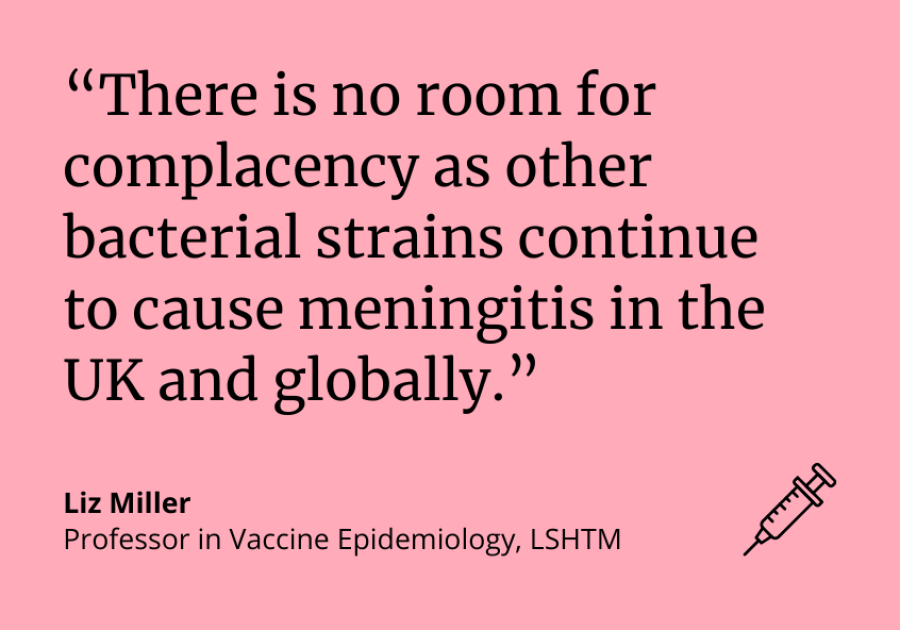Expert Comment – UK near to eliminating meningococcal C
11 December 2024 London School of Hygiene & Tropical Medicine London School of Hygiene & Tropical Medicine https://lshtm.ac.uk/themes/custom/lshtm/images/lshtm-logo-black.png
“There is no room for complacency as other bacterial strains continue to cause meningitis in the UK and globally.” Liz Miller Professor in Vaccine Epidemiology, LSHTM
Cases of meningococcal disease, known to cause meningitis and septicaemia, are continuing to decline in the UK, according to the UK Health Security Agency (UKHSA).
Meningococcal disease refers to invasive infection with the bacterium Neisseria meningitidis, also known as meningococcus, and cases usually spread through close or lengthy contact. There are 12 identified serogroups: groups B, C, W and Y were historically the most common in the UK.
The two main types of meningococcal infections are meningitis and bloodstream infections, known as sepsis. Both illnesses have a high mortality rate if left untreated, however these infections are preventable through protective vaccination.
Between July 2023 and June 2024, only three cases of meningococcal group C (MenC) disease were reported in the UK. This is a 99% decrease since the start of the UK’s National Health Service (NHS) routine vaccination programme in 1999.
Other groups of meningococcal disease, including A, W and Y, also remain very low in the UK but data shows that the decline in meningococcal Group B (MenB) cases has slowed. Experts believe this may be due to a drop in the uptake of childhood vaccinations, including the MenB vaccine, which is given to babies as part of the NHS’s Childhood Vaccination Programme.
Professor Liz Miller at the London School of Hygiene & Tropical Medicine (LSHTM) said: "The near elimination of meningitis C in England illustrates the power of vaccination and what can be achieved when research and public health communities work together for a common goal.
“The UK was the first country to introduce the meningitis C vaccine in 1999 and its success led the way for the development and successful introduction of a meningitis C vaccine in Africa.
“However there is no room for complacency as other bacterial strains continue to cause meningitis in the UK and globally, and renewed efforts are needed to achieve the WHO goal of defeating meningitis by 2030."
While the data from the UK demonstrates the positive impact of vaccination, meningitis still remains a major public-health challenge globally, with young children most at risk.
The highest burden of disease is seen in a region of sub-Saharan Africa known as the African Meningitis Belt, especially recognised to be at high risk of epidemics of meningococcal meningitis.
In April 2024, Nigeria became the first country to roll out Men5CV, a vaccine against five strains of the meningococcus bacteria: A, C, W, Y and X. Although research has shown that it is largely preventable with proper vaccination, there was a 50% jump in annual meningitis cases reported across Africa in 2023.
A key trial of the Men5CV vaccine was conducted in June 2021, led by a group of researchers at the Medical Research Council Unit The Gambia (MRCG) at LSHTM. The important data generated in this trial led to the WHO recommendation that all countries in the region should introduce the meningitis Men5CV vaccine into their routine immunisation programmes.
An earlier study convened by the World Health Organization (WHO) and led by researchers including from LSHTM, also found that WHO-recommended vaccines have provided the single greatest contribution to improved infant survival over the past 50 years.
If you enjoyed this article and would like to build a career in global health, we offer a range of MSc programmes covering health and data, infectious and tropical diseases, population health, and public health and policy.
Available on campus or online, including flexible study that works around your work and home life, be part of a global community at the UK's no.1 public health university.